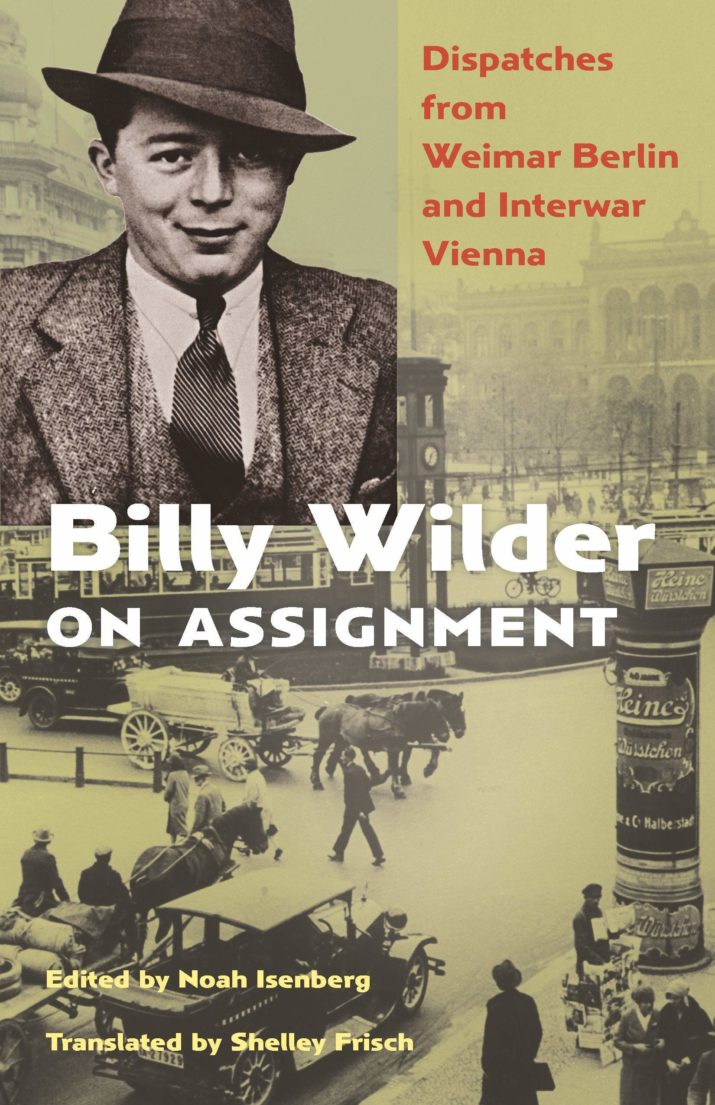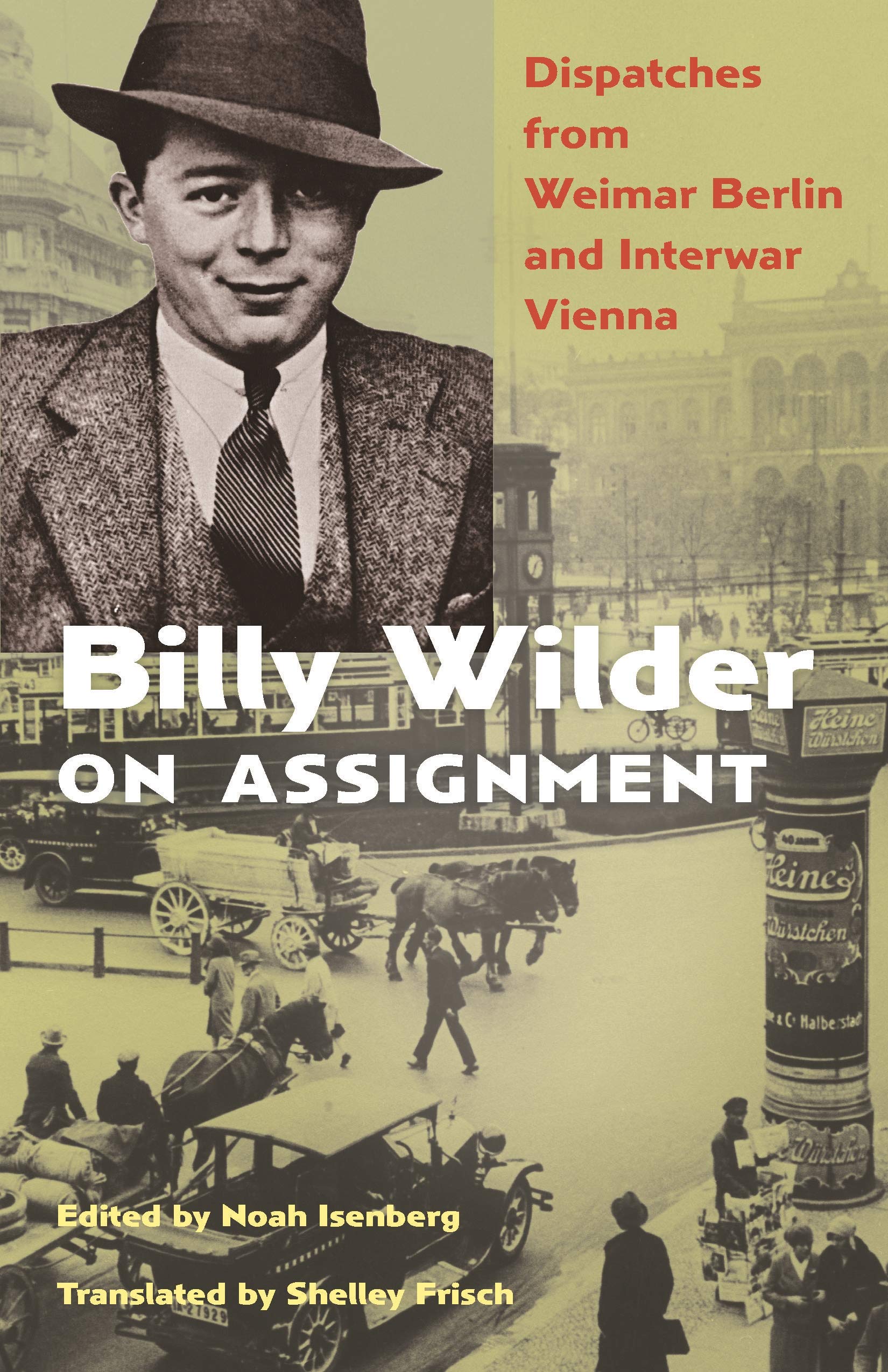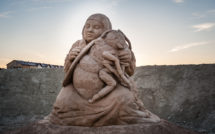
Billy Wilder on Assignment: Dispatches from Weimar Berlin and Interwar Vienna by editor Noah Isenberg, translated by Shelley Frisch

The anthology Billy Wilder on Assignment: Dispatches from Weimar Berlin and Interwar Vienna (editor Noah Isenberg, translator Shelley Frisch) provides a long-overdue translation of Billy Wilder’s early writings in German (1924-1933). Before his departure to the United States in 1934 and subsequent decades-long success in Hollywood, Wilder first worked as a freelance reporter for the Viennese tabloids Die Bühne and Die Stunde, and—after relocating to Germany in 1926—for the Berlin tabloids Berliner Zeitung (B.Z.) and Tempo, and the literary magazine Der Querschnitt. Wilder strived to emulate the style of the “racing reporter” (“der rasende Reporter”), an emblematic figure—promoted by his role model, mentor, and popular journalist Egon Erwin Kisch who was inspired by American journalism with its focus on speed, immersion in daily life, and a mode of writing to match the dynamism of modern experience. Two aspects stand out as defining features in such reporting—first, despite Wilder’s young age and relative inexperience, the texts in Billy Wilder on Assignment manifest a distinct style characterized by its engaging prose, great use of suspense, humor, and character description. Second, thematically, many of the texts cover seemingly trivial events, sites, objects, and personal traits that evoke broader social and historical phenomena, thus drawing on quotidian aspects to uncover a deeper meaning. The critical significance of the anthology is twofold—to make available in English a record from Wilder’s formative years in Europe, and provide a snapshot of life in interwar Vienna and Berlin as captured by a still relatively unknown but astute young chronicler. Billy Wilder on Assignment contributes to existing scholarship on Wilder’s legacy, to the literature on exiled European filmmakers in Hollywood, and, more broadly, to the study of European cultural history of the 1920s. The anthology will be of interest to both the academic and general public.
Organized in three parts, Billy Wilder on Assignment tackles an impressive range of topics and forms of writing. Especially Part I, fittingly titled “Extra! Extra! Reportage, Opinion Pieces, and Features from Real Life” draws attention to the heterogeneity and overwhelming scope of Wilder’s interests. Here, the readers will find, among others, travel pieces from Venice, Genoa, Monte Carlo, and an imagined New York City; reports from daily life on eclectic issues—mothballs, fire matches, and the Rose of Jericho; pieces on urban landmarks and experiences—coffeehouses in Vienna and in Berlin, a heatwave, a night flight over the German capital, and popular meeting spots in the city.
Wilder’s method can be described though a programmatic suggestion made by one of his mentors—the well-known writer during the period Klabund (pseudonym for Alfred Henschke)—that “one should write about life as it is” (164). Wilder’s investment in reality is obvious when he captures vignettes from daily life. Most texts, particularly in Part I, are written from a first-person perspective in a dynamic mix of descriptive passages, internal monologue, and dialogue that provides a well-paced take on lived experience. The prose is at times poetic and evocative, at times fast and suspenseful, but throughout it draws the reader with its constant humor. Yet, under the witty observations and preoccupation with minutia, one uncovers a broader reflection on reality. Thus, for example, the autobiographical feature “Waiter, a dancer, please! From the life of a dancer for hire” is not only a meticulous study of a milieu but also a critique of the social and economic conditions. Entertainment is rendered as a form of labor. Wilder effectively strips off the surface glamor, using irony to unmask what is behind the scenes and under the suit—a dehumanizing industry, “I make my living honestly, honestly and with difficulty, because I dance honestly and conscientiously. No wishes, no desires, no thoughts, no opinions, no heart, no brain. All that matters here are my legs, which belong to this treadmill and on which they have to stomp, in rhythm, tirelessly” (37-38). The inclusion of the dancer’s budget and descriptions of newly acquired beauty, clothing, and other items that are needed for the job add authenticity to the account, call attention to an inescapable cycle of consumption, and expose the materiality of the body as a tool of labor. Interestingly, the text evokes a shared fate—for all their wealth, the clients who hire the dancer too are represented as part of a whole. In the heat of the dance hall, they all become “one single mass of flesh, quivering in rhythm like aspic” (39).
Wilder’s indiscriminate attention to both the big and the small is also obvious in the texts in Part II. Under the heading “Portraits of Extraordinary and Ordinary People,” this part exemplifies the reporter’s excitement about his contemporaries as representatives of the historical moment and offers interviews with celebrities—among others, the Danish actress Asta Nielsen, the Austrian Jazz musician Toni Girardi, the British dance troupe Tiller Girls, American band leader Paul Whiteman, the millionaire Cornelius Vanderbilt I—and regular people—the oldest woman in Berlin, a circus clown, a newspaper saleswoman, and a lookalike man. Wilder’s humorous attention to detail—such as, for example, Whiteman’s famous mustache or Vanderbilt’s bad teeth—demonstrate his wit, talent for characterization, and ability to capture the human condition in all its curious manifestations.
While in Berlin, Wilder was also a ghostwriter of screenplays—he was first credited for Hell of a Reporter (Der Teufelsreporter, Dir: Ernst Laemmle, 1929)—and also contributed to the experimental People on Sunday (Menschen am Sonntag, Dir: Robert Siodmak, Edgar G. Ulmer, 1931). There is no direct record of the screenplays but Part III “Film and Theater Reviews” of the anthology offers short reviews about the film and theater scene as well as reports about the studio and film industry in the final years of silent cinema and during the advent of sound. Given Wilder’s later success in film, it is surprising that Part III is least representative of his imaginative writing. Aspects of Wilder’s reporting—and not necessarily his film and industry reviews—are more suggestive of his later emblematic style in film—notably, his focus on unique subject matter and character development, the great use of suspense, irony, and memorable dialogue, and a well-paced, suspenseful prose that keeps the reader engaged. At their best, Wilder’s texts from the 1920s provide keen observations of the human condition, draw on reality, and cast everyday phenomena in a new light. Yet, readers who hope to find here prophetic accounts about the rise of Nazism and Wilder’s own fate as someone who escaped Europe but lost family members in the death camps will be disappointed. Despite similarities in subject matter, Wilder’s reportages and feuilletons also lack the sophistication of those by prominent contemporaries such as Joseph Roth, Kurt Tucholsky, or Siegfried Kracauer.
Billy Wilder on Assignment uses as a source material two previous anthologies in German—Der Prinz von Wales Geht auf Urlaub (Edited by Klaus Siebenhaar, 1996) and Billie. Billy Wilders Wiener journalistische Arbeiten (Edited by Rolf Aurich, Andreas Hutter, Wolfgang Jacobsen, Günter Krenn, 2006). The similarities to Siebenhaar’s Der Prinz von Wales Geht auf Urlaub are striking—Billy Wilder on Assignment applies the same tri-partite, thematic organization and—with some minor exclusions and changes in the order—the selected texts are identical. The editor of Billy Wilder on Assignment, Noah Isenberg, describes the purpose of the anthology as follows, “[to give] the greatest sense of Wilder’s unique voice, his budding skills as a writer, his wit and intelligence, and his range” (18). Indeed, the anthology wonderfully achieves these goals and Shelley Frisch’s excellent translations deliver Wilder’s authentic or, as Frisch playfully calls it, “wild” prose in English (194). Further, Isenberg’s instructive Editor’s Introduction, “A roving reporter a tale of two cities, and the making of Billy Wilder” as well as the short introductions to each part in the anthology helpfully situate the reader in the historical moment and highlight Wilder’s contribution to the cultural scenes in Vienna and Berlin.
Yet, Isenberg’s statement that, “in some instances, we opted not to include pieces that seemed either too esoteric, too anachronistic, or simply inaccessible to an Anglo-American audience” (18) draws attention to omissions in the process of pleasing this imaginary Anglo-American reader. One wonders, for example, how the reader might have approached texts such as “Black Girls. A Neger Revue ‘Black People’ now in a guest performance at Berlin’s Metropol-Theater” (“Schwarze Girls. Im Berliner Metropol-Theater gastiert zurzeit eine Negerrevue ‚Black People‘ (Schwarzes Volk)”), not included here but available in Billie. Billy Wilders Wiener journalistische Arbeiten. The text employs sexist tropes and sexualized imagery that are not entirely absent from some reportages in Billy Wilder on Assignment and certainly deserve further critique. Yet, it is the appalling racism of “Black Girls” that strikingly stands out and cannot be dismissed as merely anachronistic or innocently representative of its times. The text presses for urgent critical reconsideration and poses the question what else is present in Wilder’s archive that might—and indeed should—complicate our understanding of one of classical Hollywood’s most renowned professionals.
Nora Gortcheva is an independent writer based in Berlin, Germany, whose research interests range from early and silent German film and exhibition to contemporary essayist practice in cinema and art, and issues of identity and migration in cinema. She has taught in the fields of German and Film Studies at Yale University, the University of Maine, Jacobs University, and Mount Holyoke College.
Billy Wilder on Assignment: Dispatches from Weimar Berlin and Interwar Vienna
By Billy Wilder
Edited by Noah Isenberg (translated by Shelley Frisch)
Publisher: Princeton University Press
Hardcover/ 224 / 2021
ISBN: 9780691194943
Published on November 9, 2021




